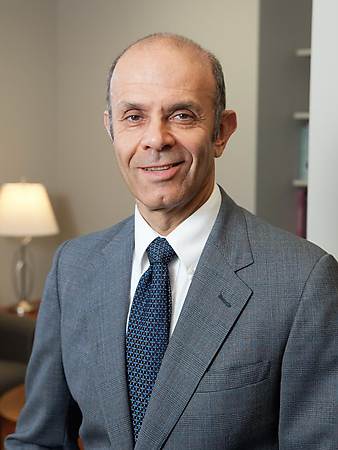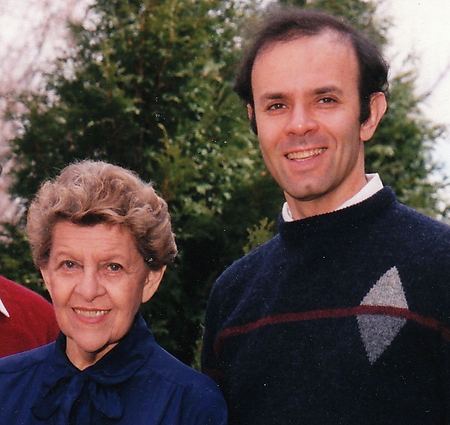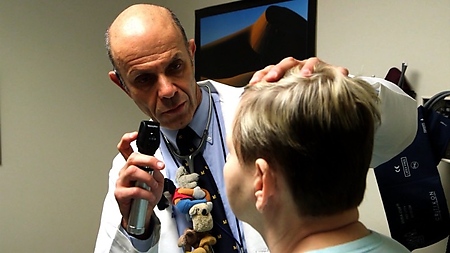Deaf Life28th May 2015
Dr. Philip Zazove Defies the so-called 'Experts on Deafness'
Given life-limiting potential because of deafness, this Doctor proves how wrong the 'experts' can be.
 Editor’s Note - Dr Philip Zazove is a quite remarkable man. Aged 4, his parents, both physicians, were told that he would be lucky to be a janitor when he grew up. Why, well simply because he had just been diagnosed as being Deaf! Going against the advice of the ‘experts’, Philip’s parents decided what was in his best interests, and with their support and empowerment, he has gone on to have a fantastic career, helping and supporting many other Deaf people in the process.
Editor’s Note - Dr Philip Zazove is a quite remarkable man. Aged 4, his parents, both physicians, were told that he would be lucky to be a janitor when he grew up. Why, well simply because he had just been diagnosed as being Deaf! Going against the advice of the ‘experts’, Philip’s parents decided what was in his best interests, and with their support and empowerment, he has gone on to have a fantastic career, helping and supporting many other Deaf people in the process.
Set out below is an article Philip wrote recently. Talking about his childhood, education and work life, Philip’s story is one of hope, ambition and achievement, underpinned by a gritty determination and a will to succeed. Talking to Philip about his life and his wonderful achievements, he kindly offered to answer a few questions for me.
Question - Do you think deafness limits what a person can go on to achieve in life?
Philip - No, I think it's the attitude one has. Yes, there will be barriers, and yes there will be setbacks. Perseverance, however, works. Also, finding mentors/people to advocate really helps too.
Question - What barriers did you face over and above the ones included in the article and how did you overcome them?
Philip - I had trouble hearing teachers - I sat in front of the class and asked them to look at me (often they forgot, of course). I also copied notes from others. Bullies, I tried to ignore as much as possible. Prejudice, I relied on my friends, mentors to help me. I also realised that it's not me but rather the prejudicial person who is the problem. Dinnertime syndrome, I asked people to repeat or explain. Now there is technology to help with much of this.
Question - If you could give three bits of advice to a Deaf youngster about their future, what would those messages be?
Philip - 1. You can do whatever you want to do. 2. Education goes a LONG way to helping. 3. Find a mentor/advocate who's willing to really work to help you.
Highlights of Philip story:
- Dr. Philip Zazove defied the odds to become one of the first deaf physicians certified in the United States
- After his diagnosis at age 4, Zazove's parents were told he would be lucky to be a janitor
- His parents, both physicians, placed him in a public school where he excelled
 When I was 4 years old, my mother and father received devastating news -- I was deaf. It was the 1950's, a time when people with disabilities received few accommodations or support. A time long before any legislation like the Americans with Disabilities Act was conceived, let alone passed. I am the first and, to date, only person in my family with a profound hearing loss. While I will never know what caused my hearing loss, my mother didn't have a normal pregnancy.
When I was 4 years old, my mother and father received devastating news -- I was deaf. It was the 1950's, a time when people with disabilities received few accommodations or support. A time long before any legislation like the Americans with Disabilities Act was conceived, let alone passed. I am the first and, to date, only person in my family with a profound hearing loss. While I will never know what caused my hearing loss, my mother didn't have a normal pregnancy.
I was born five weeks past my expected due date. I was "floppy" and very sickly from the beginning. Today, my mother would have been induced much earlier and I would have been placed in a neonatal intensive care unit. My parents, both physicians, watched me 24/7 for two weeks, shaking me every time I stopped breathing until I started again. Gradually, I became healthy and thrived like any other child.
My speech, though, was never clear. However, I clearly understood and interacted normally with everyone. My father first noticed something was wrong shortly after I turned 4, while we were putting books on a shelf. He spoke to me and I couldn't hear him.
I said, "Dad, you have to look at me when you talk to me.” "No, I don't," he said. "Yes, you do," I answered. "Otherwise, how can you understand me?"
 My parents had me tested and discovered my profound hearing loss. Experts told Mom and Dad my loss was so severe, I'd be lucky to hold a job as a janitor. They also recommended putting me in a school for the deaf.
My parents had me tested and discovered my profound hearing loss. Experts told Mom and Dad my loss was so severe, I'd be lucky to hold a job as a janitor. They also recommended putting me in a school for the deaf.
But my parents pushed back and refused to do this. They fought to enrol me in the public school system. I ended up being the first person with a profound hearing loss mainstreamed in my northern Chicago suburb. Although I did well, every year my parents had to fight to keep me there. I ended up graduating from high school with the highest honours.
Still, my experience was very different from that of my hearing peers. I had weekly speech therapy, which I hated. I missed out on movies, assembly speakers, PA announcements and more. Bullies taunted me. Some kids wouldn't include me because I was the deaf kid. Others would speak with their hands over their mouths so I couldn't see what they were saying.
What allowed me to be successful were my friends. They treated me normally. And my parents instilled in me the belief that I could do whatever I wanted.
 When I applied to college, schools couldn't believe I was deaf. The dean of one large Midwestern school interviewed me in person, then accepted me on the spot. I turned down the offer and enrolled at Northwestern University. There, I continued to excel. I played intercollegiate football, became involved in organisations and had many friends.
When I applied to college, schools couldn't believe I was deaf. The dean of one large Midwestern school interviewed me in person, then accepted me on the spot. I turned down the offer and enrolled at Northwestern University. There, I continued to excel. I played intercollegiate football, became involved in organisations and had many friends.
My second year, I applied for an Illinois scholarship for people with disabilities. The woman who interviewed me made me promise that if I became a physician, I'd learn American Sign Language so I could communicate with the deaf. After receiving the scholarship, I made sure to follow through on my promise.
During my senior year, I applied to 12 medical schools, but got only two interviews. Although my grades, activities and Medical College Admission Tests were better than many peers who were accepted, I didn't get any acceptance letters.
So I stayed at Northwestern and attended its graduate school of biology. I did well and began my application process to medical school again. This time, I applied to 35 schools. I got several interviews, one of which was at Rutgers University. Two years earlier, Rutgers accepted a deaf student. To my knowledge, that student became the second deaf American to graduate from medical school. I interviewed with the university and was accepted.
All the other 34 schools rejected my application.
My first two years of medical school were classroom and laboratory based. The summer after my first year, I made good on my promise and learned sign language by going to a local deaf club. After two years at Rutgers, I transferred to Washington University in St. Louis.
My clinical years there were hard, because I depend on lipreading. It was especially difficult during rounds where people didn't face me or when I was in an operating room where everyone wore masks. I learned the material by preparing ahead of time and asking many questions after.
 At Washington University, I met the love of my life, a classmate named Barbara Reed. We got married two days after our graduation from medical school, when I became the third deaf American physician.
At Washington University, I met the love of my life, a classmate named Barbara Reed. We got married two days after our graduation from medical school, when I became the third deaf American physician.
 My specialty is family medicine. It is clearly the right choice for me. As a husband and a father of two wonderful daughters, I enjoy caring for people of all ages. I have treated some families for over 25 years. It's a very humbling but rewarding career for which I am grateful.
My specialty is family medicine. It is clearly the right choice for me. As a husband and a father of two wonderful daughters, I enjoy caring for people of all ages. I have treated some families for over 25 years. It's a very humbling but rewarding career for which I am grateful.
 A special part of my practice is that I care for many deaf and hard of hearing persons. I understand what they are going through. My research has shown that this community has poorer health, social and educational outcomes. By providing specialised care for them, I try to provide this community with better health care opportunities. Some of my patients drive two or three hours to see me.
A special part of my practice is that I care for many deaf and hard of hearing persons. I understand what they are going through. My research has shown that this community has poorer health, social and educational outcomes. By providing specialised care for them, I try to provide this community with better health care opportunities. Some of my patients drive two or three hours to see me.
I also mentor deaf and hard of hearing physicians in training. It is so important that they know they can do it. I connect them with additional mentors for emotional support and also recommend useful technologies that may help them in their practices.

In addition to my medical practice, I am the department chair of family medicine at the University of Michigan. My family established a nonprofit foundation in honour of my mother to provide college scholarships for students with severe hearing loss.
My life has been a wonderful journey. My parents made all the difference by refusing to believe my hearing loss was an insurmountable barrier.
One of my favourite sayings is, "Expect great things and great things happen." Maybe I am an example of that. If you want to make progress and have an impact, you have to be willing to go out and drive.
You may not make it, but then you try again.
Article by Dr Philip Zazove, Author & Physician
posted in Community / Deaf Life
28th May 2015





